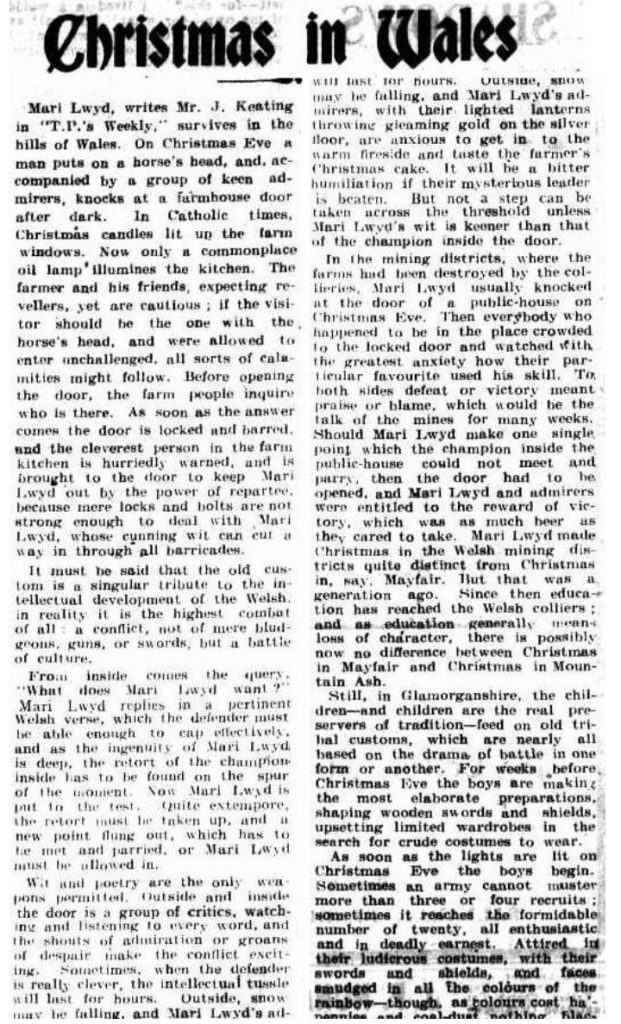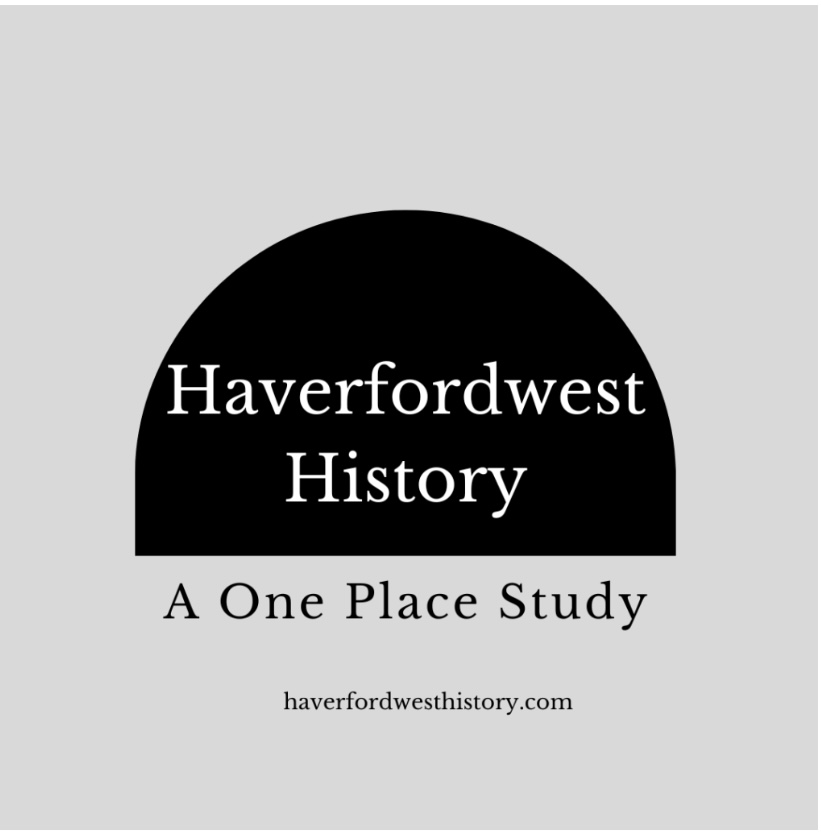I couldn’t find anything in the papers about Christmas at Haverfordwest, but I did find the following 1914 newspaper report about Christmas in Wales, in an Australian newspaper. If only traditions like this still existed!
from: the Advocate (Melbourne, Vic: 1868-191-54) Saturday 26 December 1914, Page 8

Mari Lwyd, writes Mr. J. Keating in “T.P.’s Weekly” survives in the hills of Wales. On Christmas Eve, a man puts on a horse’s head, and accompanied by a group of keen admirers, knocks at a farmhouse door after dark. In Catholic times, Christmas candles lit up the farm windows. Now only a commonplace oil lamp illumines the kitchen. The farmer and his friends, expecting revellers, yet are cautious; if the visitor should be the one with the horse’s head, and were allowed to enter unchallenged, all sorts of calamities might follow.
Before opening the door, the farm people inquire who is there. As soon as the answer comes, the door is locked and barred, and the cleverest person in the farm kitchen is hurriedly warned, and is brought to the door to keep Mari Lwyd out by the power of repartee, because mere locks and bolts are not strong enough to deal with Mari Lwyd, whose cunning wit can cut a way in through all barricades. It must be said that the old custom is a singular tribute to the intellectual development of the Welsh. In reality, it is the highest combat of all; a conflic, not of mere bludgeons, guns or swords, but a battle of culture.
From inside comes the query, “what does Mari Lwyd want?” Mari Lwyd replies in a pertinent Welsh verse, which the defender must be able enough to cap effectively, and as the ingenuity of Mar Lwyd is deep, the retort of the champion inside has to be found on the spur of the moment. Now Mari Lwyd is put to the test. Quite Extempore, the retort must be taken up, and a new point flung out, which has to be met and parried, or Mari Lwyd must be allowed in.
Wit and poetry are the only weapons permitted. Outside and inside the door is a group of critics, watching and listening to every word, and the shouts of admiration or groans of despair make the conflict exciting. sometimes, when the definder is really clever, the intellectual tussle will last for hours. Outside, snow may be falling, and Mari Lwyd’s admirers, with their lighted lanterns throwing gleaming gold on the silver floor, are anxious to get in to the warm fireside and taste the farmer’s christmas cake. It will ba a bitter humiliation if their mysterious leader is beaten. But not a step can be taken across the threshold unless Mari Lwyd’s wit is keener than that of the champion inside the door.
in the mining districts, where the farms had been destroyed by the collieries, Mari Lwyd usually knocked at the door of a public-house on Christmas Eve. then everybody who happened to be in the place crowded to the locked door and watched with the greatest anxiety how their particular favourite used his skill. To both sides, defeat or victory meant praise or blame, which would be the talk of the mines for many weeks. Should Mari Lwyd make one single point which the champion inside the public house could not meet and parry, then the door had to be opened and Mari Lwyd and admirers were entitled to the reward of victory, which was as much beer as they cared to take. Mari Lwyd made Christmas in the Welsh mining districts quite distinct from Christmas in, say, mayfair. But that wa a generation ago. Since then education has reached the Welsh colliers; and as education generally means loss of character, there is possible now no difference between Christmas in Mayfair and christmas in Mountain Ash.
Still, in Glamorganshire, the children – and children are the real preservers of tradition – feed on old tribal customs, which are nearly all based on the drama of battle in one form or another. For weeks before Christmas Eve, the boys are making the most elaborate preparations, shaping wooden swords and shields, upsetting limited wardrobes in the search for crude costumes to wear.
As soon as the lights are lit on Christmas Eve, the boys begin. Sometimes an army cannot muster more than three or four recruits; sometimes it reaches the formidable number of twenty, all enthusiastic and in deadly earnest. Attired in their ludicrous costumes, withtheir swords and shields, and faces smudged in all the colours of the rainbow – though, as colours cost ha’pennies and coal dust nothing, blackened cheeks usually predominate – they march to the door, the first invader enters, strikes a defiant attitude with his wooden sword and shield, and announces himself to the admiring kitchen:
“In comes I, bold Dingly Ding
From the corner I did spring.
My head is made of iron
My heart is made of steel
And no one in this house
Can make my body feel”
At once he is challenged by one of his own army. the challenger rushes into the kitchen with a wooden sword and shield, and after a shakespearian declamation, in which he describes himself as being a much more extraordinary person than Dingly Ding, they fight furiously. While the battle of the champions is raging, the various distinguished personages of the group outside enter one by one, each describing himself in mysterious terms. Once can drink the ocean dry, another can overtake the wind in front of him and the wind behind can’t catch him, and so on, until all the representatives of miracles and magic, since the world began are in the kitchen, grouped around the champions, who are fighting under the light of a paraffin lamp on the collier’s table. No matter which of the two combatants falls dead, no harm is done, because a most learned doctor opportunely enters, announcing himself and his talents, in glowing phrases, and giving an immediate exhibition of his genius by bending over the dead fighter and raising him to life by saying: “Jump up, Jack, and fight again.”
Cake and pennies are the climax to such an exciting display, and the drama moves on to the next house. Possibly many of the children’s games in Wales are now borrowed from other places, as the railways carry customs into the mining hills, as well as carry coals out of them. You will hear them at the doors singing:
“Christmas is coming;
The geese are getting fat,
Please to put a penny
In my old hat.
If you haven’t got a penny, a ha’penny will do
Give it to the children, and God Will bless you”
In a less particularly selfish rhyme, the children come to the door chanting a very excellent and human wish:
“I wish you a Merry Christmas
And a Happy New Year;
A pocket full of money
And a cellar full of beer”
The “cellar full of beer’ is purely poetic license, as not one of the houses, at which the rhyme is sung, possesses a cellar, and if the did, it would most probably be filled with coal. I am speaking of the mining hills of Glamorganshire.
Drowning the children’s voices on Christmas Eve, you will hear brass bands playing rather well, the instruments effectively balanced, and the harmonies good. But you will also drum and fife bands playing as only drum and fife bands can play – out of tune.
In any case, it is better than silence; because who has noty felt, how terrible, how heart-breaking is the gloom of a silent Christmas – when crowding on the mind come the memories of old days when Christmas was the time of laughter and the glory of hopes, ambitions and the promise of happiness?
But the singing of the hills is the real joy of a Welsh Christmas Day. Possible the morning dawns in clear sunshine, with snow gleaming brilliantly on the high mountains, the beautiful white fitting the valley like hiding all the black works of the collieries, and restoring the purity of nature to the entire surroundings. Then the Welsh miners and their sweethearts come out singing their wonderful harmonies, and no people on this earth can sign as the people of the Welsh hills sing; other choirs may have more technical training, more musical knowledge, more mechanical accuracy, but the emotion, the flexibility, the passionate throb are in the Welsh voices, appealing to your heart, making you feel, bringing tears to your eyes, and making you believe for a moment, that the untutored group of men and girls, their black clothes showing vividly against the shining white of the snow, might be a choir of angels come down to sing you all the human joy your should feel on Christmas Day.
*Please note: Punctuation and paragraphs have been added to the above transcription for ease and speed of reading.
1914 ‘Christmas in Wales’, Advocate (Melbourne, Vic. : 1868 – 1954), 26 December, p. 8. (Our Christmas Supplement), viewed 15 Dec 2024, http://nla.gov.au/nla.news-article151835790


